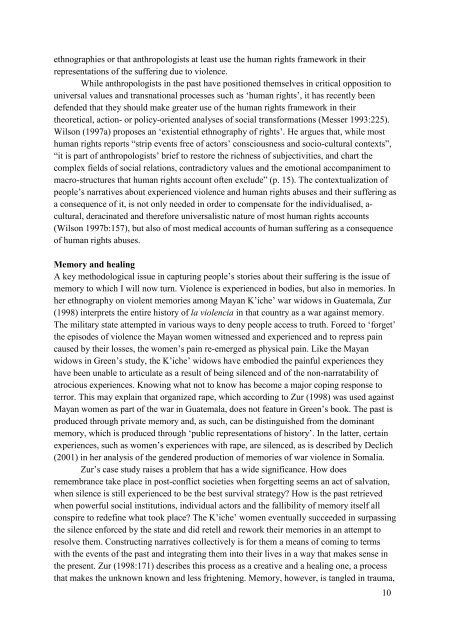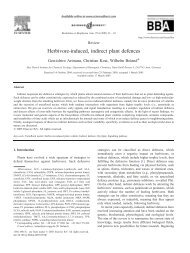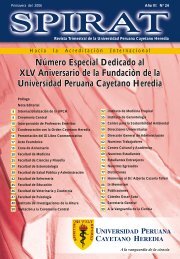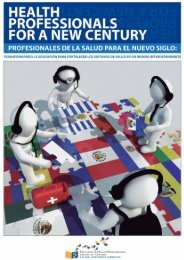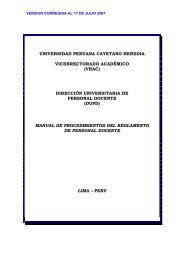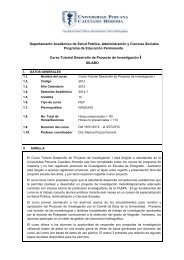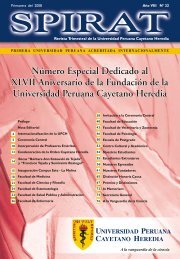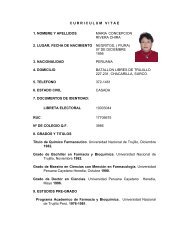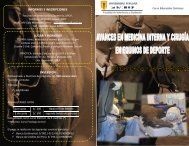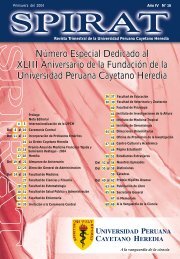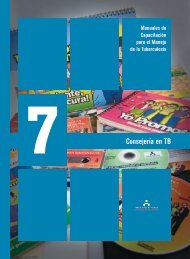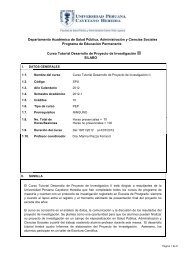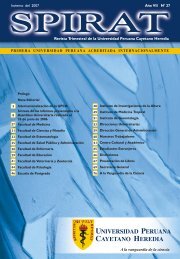1 TRAUMA AND HEALING: CROSS-CULTURAL AND ... - UPCH
1 TRAUMA AND HEALING: CROSS-CULTURAL AND ... - UPCH
1 TRAUMA AND HEALING: CROSS-CULTURAL AND ... - UPCH
Create successful ePaper yourself
Turn your PDF publications into a flip-book with our unique Google optimized e-Paper software.
ethnographies or that anthropologists at least use the human rights framework in theirrepresentations of the suffering due to violence.While anthropologists in the past have positioned themselves in critical opposition touniversal values and transnational processes such as ‘human rights’, it has recently beendefended that they should make greater use of the human rights framework in theirtheoretical, action- or policy-oriented analyses of social transformations (Messer 1993:225).Wilson (1997a) proposes an ‘existential ethnography of rights’. He argues that, while mosthuman rights reports “strip events free of actors’ consciousness and socio-cultural contexts”,“it is part of anthropologists’ brief to restore the richness of subjectivities, and chart thecomplex fields of social relations, contradictory values and the emotional accompaniment tomacro-structures that human rights account often exclude” (p. 15). The contextualization ofpeople’s narratives about experienced violence and human rights abuses and their suffering asa consequence of it, is not only needed in order to compensate for the individualised, a-cultural, deracinated and therefore universalistic nature of most human rights accounts(Wilson 1997b:157), but also of most medical accounts of human suffering as a consequenceof human rights abuses.Memory and healingA key methodological issue in capturing people’s stories about their suffering is the issue ofmemory to which I will now turn. Violence is experienced in bodies, but also in memories. Inher ethnography on violent memories among Mayan K’iche’ war widows in Guatemala, Zur(1998) interprets the entire history of la violencia in that country as a war against memory.The military state attempted in various ways to deny people access to truth. Forced to ‘forget’the episodes of violence the Mayan women witnessed and experienced and to repress paincaused by their losses, the women’s pain re-emerged as physical pain. Like the Mayanwidows in Green’s study, the K’iche’ widows have embodied the painful experiences theyhave been unable to articulate as a result of being silenced and of the non-narratability ofatrocious experiences. Knowing what not to know has become a major coping response toterror. This may explain that organized rape, which according to Zur (1998) was used againstMayan women as part of the war in Guatemala, does not feature in Green’s book. The past isproduced through private memory and, as such, can be distinguished from the dominantmemory, which is produced through ‘public representations of history’. In the latter, certainexperiences, such as women’s experiences with rape, are silenced, as is described by Declich(2001) in her analysis of the gendered production of memories of war violence in Somalia.Zur’s case study raises a problem that has a wide significance. How doesremembrance take place in post-conflict societies when forgetting seems an act of salvation,when silence is still experienced to be the best survival strategy? How is the past retrievedwhen powerful social institutions, individual actors and the fallibility of memory itself allconspire to redefine what took place? The K’iche’ women eventually succeeded in surpassingthe silence enforced by the state and did retell and rework their memories in an attempt toresolve them. Constructing narratives collectively is for them a means of coming to termswith the events of the past and integrating them into their lives in a way that makes sense inthe present. Zur (1998:171) describes this process as a creative and a healing one, a processthat makes the unknown known and less frightening. Memory, however, is tangled in trauma,10


